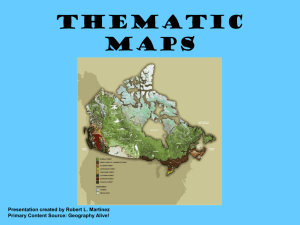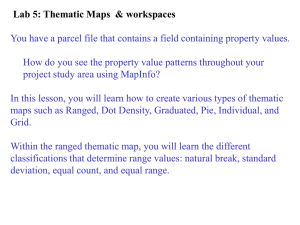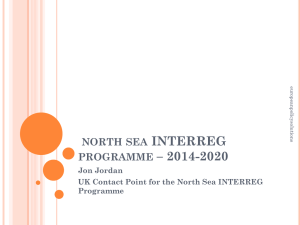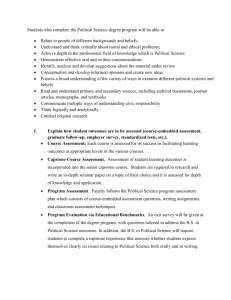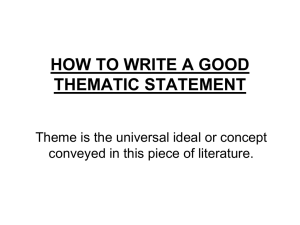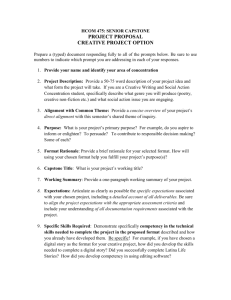Global Miami Plan Requirements
advertisement
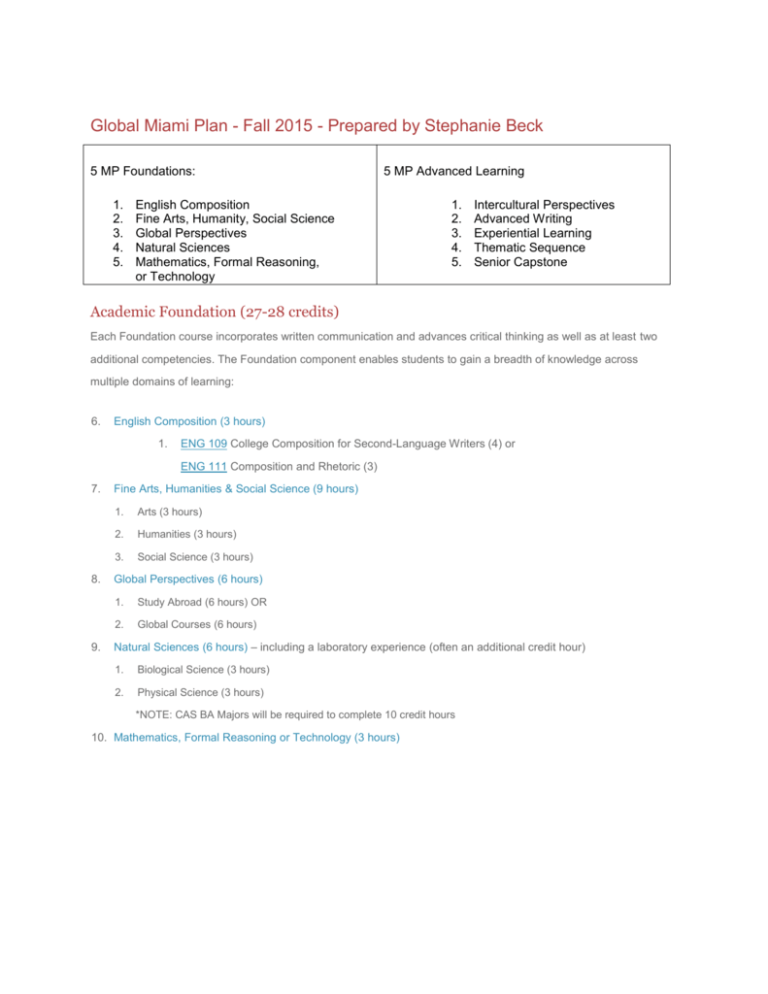
Global Miami Plan - Fall 2015 - Prepared by Stephanie Beck 5 MP Foundations: 1. 2. 3. 4. 5. 5 MP Advanced Learning English Composition Fine Arts, Humanity, Social Science Global Perspectives Natural Sciences Mathematics, Formal Reasoning, or Technology 1. 2. 3. 4. 5. Intercultural Perspectives Advanced Writing Experiential Learning Thematic Sequence Senior Capstone Academic Foundation (27-28 credits) Each Foundation course incorporates written communication and advances critical thinking as well as at least two additional competencies. The Foundation component enables students to gain a breadth of knowledge across multiple domains of learning: 6. English Composition (3 hours) 1. ENG 109 College Composition for Second-Language Writers (4) or ENG 111 Composition and Rhetoric (3) 7. 8. 9. Fine Arts, Humanities & Social Science (9 hours) 1. Arts (3 hours) 2. Humanities (3 hours) 3. Social Science (3 hours) Global Perspectives (6 hours) 1. Study Abroad (6 hours) OR 2. Global Courses (6 hours) Natural Sciences (6 hours) – including a laboratory experience (often an additional credit hour) 1. Biological Science (3 hours) 2. Physical Science (3 hours) *NOTE: CAS BA Majors will be required to complete 10 credit hours 10. Mathematics, Formal Reasoning or Technology (3 hours) Advanced Learning Intercultural Perspectives (3 credits) The Intercultural Perspectives requirement expands on the learning outcomes of the Global Miami Plan foundation requirements. These courses prepare students for effective citizenship in a diverse multicultural society in the US or beyond by helping students to recognize new perspectives about their own cultural rules and biases. Intercultural Perspectives courses prepare students for effective citizenship in a diverse multicultural society in the U.S. or beyond. In these courses, students will recognize new perspectives about their own cultural rules and biases by: Demonstrating an understanding of the ways marginalized and dominant groups define and express themselves, and the contexts in which these definitions are constructed, and/or Demonstrating an understanding of how such global forces as imperialism, colonialism, religion, globalization, capitalism, and socialism have shaped ideas, groups, institutions, and/or the natural environment, and/or Demonstrating an understanding of theories addressing notions of race, gender, sexuality, class, disability, ethnicity, nationalism, and/or other socially constructed categories. Advanced Writing Course (3 credits) Advanced writing courses (200 or 300 level) are offered by instructors in disciplines, departments, and programs across the university and feature student writing as the central focus, frequent opportunities to write with instructor feedback on multiple drafts of major projects, and substantial writing projects. Students are advised to take an advanced writing course in their second or third year. Advanced writing courses feature: Student writing as the central focus (with the majority of class time dedicated to instruction on and activities about writing) Frequent opportunities to write with ongoing instructor feedback on multiple drafts of major projects Multiple, substantial writing projects (at least 7500 words over the course of the term) These courses are ideally capped at 20 students to facilitate instructor feedback. Experiential Learning (EL) Requirement (0 or more credits) Experiential learning is the process of making meaning from direct experience in a real world or an “out of the traditional classroom” context. It offers students the opportunity to initiate lifelong learning through the development and application of academic knowledge and skills in new or different settings. The EL requirement can be met through a Global Miami Plan course or course in the major (at the lower or upperdivision level) that has been approved for this requirement. Some of the approved courses include designated service-learning courses, credit- and non-credit-bearing internships, independent studies (numbered 177, 277, 377 or 477) that involve significant independent work focusing on research and including a presentation, lab, or archive component (carrying the “R” modifier), and student teaching. In experiential learning, educators purposefully engage with learners in direct experience and written reflection in order to increase knowledge, develop skills, and clarify perspectives or values. Experiential learning may fall into one or more of the following categories: Undergraduate Research enables students to engage in systematic inquiry that contributes to the discovery or interpretation of knowledge significant to their field of study. Research can be applied, descriptive, experimental, creative, inferential, observational, or theoretical. Examples can include: course that involves client-based project, Undergraduate Summer Scholars Program, FYRE Program, honors thesis, or significant independent work focusing on research and including a presentation, lab, or archive component. Creative and Artistic Activities enable students to engage in various forms or creative expression to produce works that reflect a synthesis of knowledge and skills. Examples include recitals, exhibitions, or other significant artistic projects that would take significant training as well as the equivalent of at least a semester to propare. Community/Civic Engagement enables students to interact with people from diverse backgrounds, to challenge their understanding of community needs, and to explore ways of partnering with community members to address problems or improve community life. Examples include: Service-Learning courses, semester-long community engagement, or civic projects. Career & Practical Experiences enable students to use skills and concepts learned in the classroom while engaging in work-like settings that relate to their field of study.or possible career path. Examples include: internship, co-ops, student teaching, Undergraduate Associates Program, tutoring experience, practica, or clinical experiences. Criteria for Experiential Learning Connection of academic ideas, concepts, and skills to a new and different context Facilitated and guided practice Sustained duration or immersion (the amount of time engaged should be the equivalent of at least one credit for at least one academic term). Opportunity for reflection on the learning goads and relation of experience to relevant liberal education competencies. Thematic Sequence (9 credits) A Thematic Sequence is a series of related courses (usually three) that focuses on a theme or subject in a developmental way. Each course builds or expands upon knowledge or perspective gained from preceding courses, and some sequences prepare students for Capstone experiences. The first course may be a Foundation course and may count as hours in both Foundation and Thematic Sequence requirements. (Should the Thematic Sequence contain more than one Foundation course, only one of those courses can be counted for both requirements.) In interdepartmental Thematic Sequences, students must select those courses that are offered outside their department of major. For example, English majors who enroll in a Thematic Sequence comprised of English and history courses must register for the history courses. Students who are completing the Global Miami Plan for Liberal Education must complete at least one Thematic Sequence outside the department of their major. Exceptions to this requirement include either students with majors in two different academic departments or students with minors outside their department of major. Students should consult divisional requirements for further restrictions on Thematic Sequences. Students who wish to meet the Thematic Sequence requirement through a double major or a minor must complete the second major or minor outside their department of major. A student who uses a minor to complete the thematic sequence requirement must have 9 hours in the minor outside the department/program of his/her major, and at least 6 hours of these courses at the 200 level or above. Typically, you are expected to complete most of your Foundation courses before beginning a Thematic Sequence. To enroll in a sequence, contact the department. Students may propose self-designed sequences. Capstone Course (3 credits) The capstone course requirement is met by completing three hours in an approved capstone course during a student’s senior year (minimum of 96 hours concurrently registered or earned). Capstone courses feature a substantial written student-initiated project that encourages students to integrate knowledge gained throughout their undergraduate experience. Each Capstone emphasizes sharing of ideas, synthesis, and critical, informed reflection as significant precursors to action, and each includes student initiative in defining and investigating problems or projects. Capstones may be completed in or outside students' majors; in some departments, the Capstone Experience may be a requirement of the major. All Capstones presume a significant scholarly background of specialized study in a major as well as in liberal education course work. In other words, a Capstone does more than culminate years of baccalaureate study: it culminates a student's liberal education.
